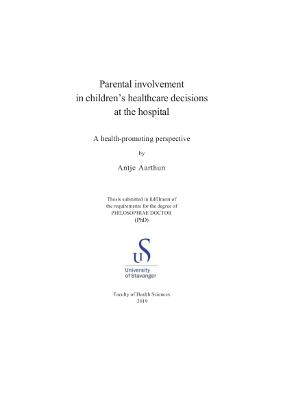Parental involvement in children’s healthcare decisions at the hospital: A health-promoting perspective
Keywords:
barn på sykehus, foreldre, barnehelse, helsefremmingSynopsis
Background: In many Western countries, parents have a legal right to be involved and influence children’s healthcare decisions, ensuring that children’s healthcare is shaped and customised as far as possible to meet the children’s and their families’ needs and preferences. It is expected that this kind of parental involvement increases patient safety and quality of care. Parental involvement in children’s healthcare decisions has been an important area of health services in several countries for many years; however, it has not been sufficiently implemented in clinical practice. Aim: This thesis’ overall aim was to gain insight, from a healthpromoting perspective, into parental involvement in decision-making about shaping and customising children’s healthcare in an interprofessional hospital environment. The purpose was to enhance the knowledge on parental involvement in these decision-making processes and to identify areas for improvement. The research aims were as following: 1) To describe and establish a synthesis of previous research on parents’ perceptions of their participation in decision-making and the challenges they face in healthcare services for children. (Paper I) 2) To explore parents’ experiences on parental involvement in decisionmaking about their child’s healthcare at the hospital and to identify how health professionals can improve parental involvement. (Paper II) 3) To explore and describe parents’ experiences of how healthprofessionals facilitate parental involvement in decision-making surrounding children’s healthcare and to identify how health professionals can improve parental involvement in the hospital. (Paper III) 4) To explore health professionals’ construction of the phenomenon parental involvement in decision-making about children’s healthcare at the hospital and identify how parental involvement can be improved. (Paper IV) Methodology: This thesis uses an explorative, sequential, descriptive, qualitative design; is situated within a constructivist research paradigm; and involves four sub-studies (Paper I-IV). Sub-study 1 is a systematic integrated review on literature, published from January 2000 to February 2011, concerning research aim 1). This review was conducted according to Whittemore and Knafl’s framework. Sub-studies 2 through 4 are explorative, descriptive, qualitative studies involving individual semi-structured interviews. Sub-studies 2 and 3 comprise a purposive sample of 12 parents. Qualitative content analysis was performed according to Graneheim, Lindgren and Lundman. Sub-study 4 recruited 12 health professionals using a purposive selection procedure. The construction of the phenomenon in the interviews was analysed according to Silverman. The cultural stories were then interpreted and organised using Graneheim et al.’s qualitative content analysis. Findings: This thesis contributes new insights into parents’ and health professionals’ roles during decision-making about shaping and customising children’s healthcare at hospital. Parents’ personal factors seemed to influence their involvement; however, health professionals’ individually tailored facilitation of parental involvement appeared to empower the parents and increase active engagement. The health professionals’ attitudes and competencies seemed to influence how they involved the parents. Important elements that seem to improve parental involvement included empathetic communication, confidence in the health professional-parent relationship, high-quality intra- and interprofessional collaboration and adequate organisational resources. Conclusion: This thesis highlights the complexity of shared decisionmaking about children’s healthcare, including parents’ and health professionals’ essential, demanding roles. These roles need to be supported according to family-centred care, the World Health Organisation’s health promotion strategy and the biopsychosocial theory. The foremost responsibility of healthcare managers is to facilitate health professionals’ parental involvement and arrange for adequate organisational resources. Furthermore, this thesis provides new knowledge of how health professionals’ practice of shared decisionmaking in paediatric clinical settings influences parents’ ability to cope with their parental role and the quality of their children’s healthcare. Increased understanding of involving both the paediatric patient and parents in these decision-making processes is required to safeguard the paediatric patients a technical, safe and justifiable healthcare that is in keeping governmental directives, evidence-based practice and the biopsychosocial theory.


